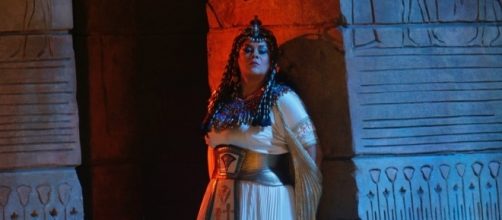Metropolitan Opera routinely attracts major performers, conductors, designers and directors the world over. This is true of its present 14-performance run of ‘Aïda,’ Giuseppe Verdi’s four-act grandest of grand operas (1871) that spares nothing: pomp, pageantry and epic sweep. Yet it focuses on the quiet private drama of its three main characters. Bulgarian soprano Krassimira Stoyanova is the title character of the day, an Ethiopian slave in the Egyptian Pharaoh’s court, who no one knows is a princess. Italian tenor Riccardo Massi nobly portrays military commander Radamès, equally drawn to Aïda as she is to him, while fleeing the advances of Pharaoh’s daughter Amneris, sung by Lithuanian dramatic mezzo-soprano Violeta Urmana.
Tale of distinction
Sure, two princesses vie for the same warrior, but this is not a typical tired tale of snarky sopranos undercutting one other. Both women are dignified and unflappable. They and Radamès—three eloquently-drawn characters—depict people with credible passions and predicaments, despite the royal setting amid flaming patriotism and a bellicose backstory. In suspending disbelief, it’s not too much of a stretch to feel true sympathy for each one, and it becomes increasingly harder to know whom to root for. Amneris, for example, at first seems heavy-handed, entitled and manipulative, but she is, after all, heir to the throne of an entire world power and must look out for her interests, for dynastic reasons alone.
Fabulous orchestra, stellar chorus
Milanese conductor Daniele Rustioni leads a cohesive pit-and-stage collaboration, commanding the world-class Metropolitan Opera Orchestra with finesse in the particularly delicate, softer passages of the luminous score. Especially gorgeous is the Act I prelude—so unlike Verdi—with its whispering “Aïda motif” steadily wafting ever higher, only to be trodden down again by the ensuing weighty canon of the “priestly motif.” Chorus Master Donald Palumbo’s unerring Metropolitan Opera Chorus, unmatched virtually anywhere on the planet, provided stunning polyphony in Act II’s triumphal scene. Yet numerous other times, singing offstage with considerable restraint, their masterful blending added shimmering beauty to the goings-on onstage.
Plethora of pianissimi
Moments of quasi-bombast abound in this structurally varied work, but gentler interludes, in stark contrast, brim with splendor. Radamès’ perilous opening aria, “Celeste Aïda,” starts with blaring brass fanfare but fades to a heartrending pianissimo High C. Riccardo Massi, whose heroic yet sweet voice has an appealing darkness or baritonal character, is certainly up to the challenge and carries it off as written. Krassimira Stoyanova’s role is packed with phrases to be sung pianissimo, and she deftly dispatches them with wondrous luster, equally as impressive as her abundant full-throated passages.
Powerhouse pivotal role
"Verdi,"` Mary Jane Phillips-Matz’s hefty biography, says the composer considered titling this opera ‘Amneris.’ From Violeta Urmana’s performance, which exploits Amneris’ every subtlety, it’s easy to see why.
Amneris’ character is gradually revealed in numerous duets and ensembles, unlike Aïda and Radamès, who each have arias in Act I for starters. Finally, Act IV, Scene 1, is hers alone, augmented by the brief interventions of Radamès and of the male chorus. Violeta Urmana owns the stage in the tour-de-force Judgment Scene. Her confused, disjointed recitative, interrupted by a heated duet with Radamès, gives way to her staggering, heartbroken aria, “Ohimè! … morir mi sento!” (Dear me! I’m dying!).
Amneris’ desperate outbursts begging the gods for clemency during the offstage trial and sentencing of her would-be husband, create riveting suspense. She rails against the all-powerful priests, hurling invective and condemning them as murderers—bold stuff for any woman, even Pharaoh’s daughter.
And though the lovers’ ethereal duet in Scene 2 crowns the opera, Violeta Urmana with perfectly distinguished subtlety intones Amneris’ hollow, grief-stricken pleas for peace. As quietly as the opera begins, she has the last word: a whispered “pace” (peace), a fantastic final say, skin-tingling precisely because of its frailty.
Low voices
Volcanic baritone George Gagnidze as Ethiopia’s king Amonasro, stalwart bass-baritone James Morris—in his 1,085th Met appearance since his Company debut (1971)—as Ramfis the high priest and thunderous bass Soloman Howard as Pharaoh effectively balance the three main characters’ higher voices. Each shines in his respective bronze or golden tone. None is gravelly or bombastic, though all could easily blast if they chose to do so.
Others too numerous to …
Mezzo-soprano Jennifer Johnson Cano voluptuously sings offstage as the priestess. Making his 329th Met appearance just three days before the 34th anniversary of his Company debut, tenor Ronald Naldi capably takes the part of Messenger, catalyzing the Egyptian army’s counterattack against Ethiopia. Dancers Jennifer Cadden and Scott Weber supply an elegant, energetic pas de deux for Amneris’ entertainment in Act II, Scene 1. In the succeeding triumphal scene, 16 ballerinas and danseurs execute the extensive ballet segment. That scene with its host of supernumeraries boasts a total population of some 200 humans and four horses.
Sole quibble
The only disappointment came from occasional balance problems, when Maestro Rustioni would have done well to dial down the orchestral volume by just five percent to avoid covering the soloists.
This is the first triumphal scene where not even Krassimira Stoyanova’s exquisite squillo could cut through the massive ensemble and be heard floating above the tsunami of sonority.
‘Aïda,’ by Giuseppe Verdi: one performance left, April 20, Metropolitan Opera, Lincoln Center for the Performing Arts, New York, N.Y.

